- Home
- Alice Hoffman
Practical Magic Page 4
Practical Magic Read online
Page 4
“Come with us,” Gillian said.
“No,” Sally said. “Impossible.” Certain facts of love she knew for certain. “Only two people can elope.”
There were dozens of stones falling on the roof; there were a thousand stars in the sky.
“I’ll miss you too much,” Gillian said.
“Go on,” Sally said. She’d be the last one in the world to hold her sister back. “Go now.”
Gillian hugged Sally one last time, and then she disappeared out the window. They’d fed the aunts barley soup laced with a generous amount of whiskey, so the old women were asleep on the couch. They never heard a thing. But Sally could hear her sister running down the bluestone path, and she wept all that night and imagined she heard footsteps when nothing was moving outside but the garden toads. In the morning, Sally went outside to collect the white sheets Gillian had left in a heap beside the wisteria. Why was Sally the one who always stayed behind to do laundry? Why did she care that there were dirt stains in the fabric that would need extra bleaching? She had never felt more alone or lonely. If only she could believe in love’s salvation, but desire had been ruined for her. She saw craving as obsession, fervor as heated preoccupation. She wished she had never sneaked down the back stairs to listen in while the aunts’ customers cried and begged and made fools of themselves. All of that had only served to make her love-resistant, and frankly, she thought she’d probably never change.
For the next two years postcards from Gillian would occasionally arrive, with hugs-and-kisses and wish-you-were-heres, but without a forwarding address. During this time Sally had less hope that her life would open up into something other than cooking meals the aunts didn’t want and cleaning a house where the woodwork never needed polishing. She was twenty-one; most of the girls her age were finishing up college, or getting a raise at work so they could move into their own apartments, but the most exciting thing Sally did was walk to the hardware store. Sometimes it took close to an hour for her to choose between cleansers.
“What do you think? What’s best for a kitchen floor?” she’d ask the clerk, a good-looking young man who was so confused by this question he’d simply point to the Lysol. The clerk was six-foot-four, and Sally could never see the expression on his face as he directed her to the preferred cleaning product. If she had been taller, or had climbed up on the stepladder used for stocking the shelves, Sally would have noticed that whenever the clerk looked at her his mouth was open, as if there were words he wished would spill out of their own accord to convey what he was too shy to speak of.
Walking home from the hardware store, Sally kicked at stones. A band of black birds took to following her, screaming and cawing over what a laughable creature she was, and although she cringed each time the birds flew overhead, Sally agreed with them. Her fate appeared to be set. She would forever be scrubbing the floor and calling the aunts in from the garden on afternoons that were too chilly and damp for them to be down in the dirt on their hands and knees. In fact, the days were seeming more and more similar, interchangeable even; she barely noticed the difference between winter and spring. But summertime in the Owens house had its own delineation—that dreadful bird who invaded their peace—and when the next midsummer’s evening arrived, Sally and the aunts were ready for their unwanted guest, as they were every year. They were waiting in the dining room for the sparrow to appear, and nothing happened. Hours passed—they could hear the clock in the parlor—and still, no arrival, no flutter, no feathers. Sally, with her odd fear of birds in flight, had tied a scarf around her head, but now she saw there was no need for it. No bird came in through the window or through the hole in the roof the handyman hadn’t managed to find. It did not fly around three times to announce misfortune. It did not even tap at the window with its small sharp beak.
The aunts looked at each other, puzzled. But Sally laughed out loud. She, with her insistence of proof, had just been granted some powerful evidence: Things changed. They shifted. One year was not just like the next and the one after and the one after that. Sally ran from the house and she kept right on running until she got to the front of the hardware store, where she crashed into the man she would marry. As soon as she looked at him, Sally felt dizzy and had to sit on the curb, with her head down so she wouldn’t faint, and the clerk who knew so much about washing a kitchen floor sat right beside her, even though his boss yelled for him to get back to work, since a line had already formed at the cash register.
The man Sally fell in love with was named Michael. He was so thoughtful and good-natured that he kissed the aunts the first time he met them and immediately asked if they needed their trash taken out to the curb, which won them over then and there, no questions asked. Sally married him quickly, and they moved into the attic, which suddenly seemed the only place in the world where Sally wished to be.
Let Gillian travel from California to Memphis. Let her marry and divorce three times in a row. Let her kiss every man who crossed her path and break every promise she ever made about coming home for the holidays. Let her pity her sister, cooped up in that old house. Sally did not mind a bit. In Sally’s opinion, it was impossible to exist in the world and not be in love with Michael. Even the aunts had begun to listen for the sound of his whistle when he came home from the hardware store in the evenings. In autumn, he turned the garden for the aunts. In winter, he put up the storm windows and filled in the cracks around the foggy old windows with putty. He took the ancient Ford station wagon apart and put it back together, and the aunts were so impressed they gave him the car, as well as their abiding affection. He knew enough to stay out of the kitchen, especially at twilight, and if he noticed the women who came to the back door, he never questioned Sally about them. His kisses were slow and deep and he liked to take off Sally’s clothes with the bedside table light turned on and he always made certain to lose when he played gin rummy with one of the aunts.
When Michael moved in, the house itself began to change, and even the bats in the attic knew it and took to nesting out by the garden shed. By the following June, roses had begun to grow up along the porch railing, choking out ragweed, instead of the other way around. In January, the draft in the parlor disappeared and ice would not form on the bluestone path. The house stayed cheery and warm, and when Antonia was born, at home, since a horrid snowstorm was brewing outside, the chandelier with the glass teardrops moved back and forth all on its own. Throughout the night, it sounded as if a river were flowing right through the house; the noise was so beautiful and so real that the mice came out of the walls to make certain the house was still standing and that a meadow hadn’t taken its place.
Antonia was given the last name of Owens, at the aunts’ insistence, in accordance with family tradition. The aunts set about spoiling the child immediately, adding chocolate syrup to her bottles of formula, allowing her to play with unstrung pearls, taking her into the garden to make mud pies and pick chokeberries as soon as she could crawl. Antonia would have been perfectly happy to be an only child forever, but three and a half years later, at midnight exactly, Kylie was born, and everyone noticed right away how unusual she was. Even the aunts, who could not have loved another child more than Antonia, predicted that Kylie would see what others could not. She tilted her head and listened to the rain before it fell. She pointed to the ceiling moments before a dragonfly appeared in the very same spot. Kylie was such a good baby that people who peeked into her stroller felt peaceful and sleepy just looking at her. Mosquitoes never bit her, and the aunts’ black cats wouldn’t scratch her, even when she grabbed for their tails. Kylie was a peach of an infant, so sweet and so mild that Antonia grew greedier and more selfish by the day.
“Look at me!” she’d cry, whenever she dressed up in the aunts’ old chiffon dresses or when she finished every pea on her plate. Sally and Michael patted her head and went about taking care of the baby, but the aunts knew what Antonia wanted to hear. They took her out to the garden at midnight, an hour too late for a silly infant, a
nd they showed her how nightshade bloomed in the dark, and how, if she listened carefully with her big-girl’s ears, which were much more sensitive to sound than her little sister’s ever would be, she could hear the earthworms moving through the soil.
To celebrate the baby’s arrival, Michael had invited everyone who worked at the hardware store, which he now managed, and all the people on their block to a party. To Sally’s surprise they all showed up. Even those guests who’d been afraid to hurry past their front walkway on dark nights seemed eager to come and celebrate. They drank cold beer and ate icebox cake and danced along the bluestone path. Antonia was dressed in organdy and lace, and a circle of admirers applauded when Michael lifted her onto an old picnic table so she could sing “The Old Gray Mare” and “Yankee Doodle.”
At first the aunts refused to participate and insisted upon watching the festivities through the kitchen window, like black pieces of paper taped against the glass. They were antisocial old dames who had better things to do with their time, or so they maintained. But even they couldn’t resist joining in, and when at last everyone raised a glass of champagne in tribute to the new baby, the aunts shocked them all when they came into the garden for the toast. In the spirit of a good time, they threw their glasses onto the path, not caring that for weeks afterward shards would appear in the earth between the rows of cabbages.
You will not believe how everything has changed, Sally confided to her sister. She wrote to Gillian at least twice a month, on pale blue paper. Sometimes she would misfire completely, sending her letters to St. Louis, for instance, only to discover that her sister had already moved to Texas. We seem so normal, Sally wrote. I think you might faint if you could see us. I really and truly do.
They had dinner together every night when Michael came home from work, and the aunts no longer shook their heads when they saw the healthy platters of vegetables Sally insisted on serving her daughters. Though they set no store by good manners, they didn’t cluck their tongues when Antonia cleared the table. They didn’t complain when Sally signed Antonia up for nursery school at the community center, where she was taught to say “Please” and “Thank you” when she wanted cookies and where it was suggested that it might be best not to carry worms in her pockets if she wanted the other little girls to play with her. The aunts did, however, put their foot down about children’s parties, since that would mean cheerful, rowdy monsters traipsing through the house, laughing and drinking pink lemonade and leaving piles of jelly beans between the couch cushions.
For birthdays and holidays, Sally took to giving parties in the back room of the hardware store, where there was a gum-ball machine and a metal pony that would give free rides all afternoon if you knew to kick it in the knees. An invitation to one of these parties was coveted by every child in town. “Don’t forget me,” the girls in Antonia’s class would remind her as the day of her birthday approached. “I’m your best friend,” they’d whisper, as Halloween and the Fourth of July drew near. When Sally and Michael took the children for walks, neighbors waved to them instead of quickly crossing the street. Before long, they found themselves invited to potluck suppers and Christmas parties, and one year Sally was actually placed in charge of the pie booth at the Harvest Fair.
It’s just what I wanted, Sally wrote. Every single thing. Come visit us, she begged, but she knew Gillian would never come back of her own free will. Gillian had confessed that when she even thought the name of their town, she broke out in hives. Just seeing a map of Massachusetts made her sick to her stomach. The past was so wretched she refused to think about it; she still woke in the night remembering what pathetic little orphans they’d been. Forget a visit. Forget any sort of relationship with the aunts, who never understood what it meant for the sisters to be such outsiders. Someone would have to pay Gillian a quarter of a million, cash, to get her to cross back over the Mississippi, no matter how much she would love to see her dear nieces, who were, of course, always in her thoughts.
The lesson Sally had learned so long ago in the kitchen—to be careful what you wish for—was so far and so faded it had turned to yellow dust. But it was the sort of dust that can never be swept up, and instead waits in the corner and blows into the eyes of those you love when a draft moves through your house. Antonia was nearly four, and Kylie was beginning to sleep through the night, and life seemed quite wonderful in every way, when the deathwatch beetle was found beside the chair where Michael most often sat at supper. This insect, which marks off time, clicking like a clock, issues the sound no one ever wants to hear beside her beloved. A man’s tenure on earth is limited enough, but once the beetle’s ticking begins there’s no way to stop it; there’s no plug to pull, no pendulum to stop, no switch that will restore the time you once thought you had.
The aunts listened to the ticking for several weeks and finally drew Sally aside to issue a warning, but Sally would pay no attention. “Nonsense,” she said, and she laughed out loud. She tolerated the clients who still came to the back door at dusk every now and then, but she would not allow the aunts’ foolishness to affect her family. The aunts’ practice was rubbish and nothing more, a gruel mixed up to feed the delusions of the desperate. Sally wouldn’t hear another word about it. She wouldn’t look when the aunts insisted on pointing out that a black dog had taken to sitting out on the sidewalk every evening. She wouldn’t listen when they swore that the dog always pointed its face to the sky whenever Michael approached, and that it howled at the sight of him and quickly backed away from his shadow, tail between its legs.
In spite of Sally’s admonition, the aunts placed myrtle beneath Michael’s pillow and urged him to bathe with holly and a bar of their special black soap. Into his jacket pocket they slipped the foot of a rabbit they had once caught eating their lettuce. They mixed rosemary into his breakfast cereal, lavender into his nightly cup of tea. Still they heard the beetle in the dining room. Finally they said a prayer backward, but of course that had consequences of its own: soon everyone in the house came down with the flu and insomnia and a rash that wouldn’t go away for weeks, not even when a mixture of calamine and balm of Gilead was applied to the skin. By the end of the winter, Kylie and Antonia had begun crying whenever their father tried to leave the room. The aunts explained to Sally that no one who was doomed could hear the sound of the deathwatch beetle, and this was why Michael insisted that nothing could possibly go wrong. All the same he must have known something: He stopped wearing a watch and set back all the clocks. Then, when the ticking grew louder, he pulled down all the shades in the house and kept them drawn against the sun and the moon, as if that could stop time. As if anything could.
Sally didn’t believe a word the aunts said. Still she grew nervous from all this talk of death. Her skin became blotchy; her hair lost its shine. She stopped eating and sleeping and she hated to let Michael out of her sight. Now whenever he kissed her, she cried and wished she had never fallen in love in the first place. It had made her too helpless, because that’s what love did. There was no way around it and no way to fight it. Now if she lost, she lost everything. Not that it would happen just because the aunts said it would. They were know-nothings, as a matter of fact. Sally had gone down to the public library and looked through every entomological reference book. The deathwatch beetle ate wood and nothing more. How did the aunts like that! Furniture and woodwork might be in danger, but flesh and blood were safe, or so Sally then believed.
One rainy afternoon, as she was folding a white tablecloth, Sally thought she heard something. The dining room was empty and no one else was home, but there it was. A click, a clatter, like a heartbeat or a clock. She covered her ears with her hands, allowing the tablecloth to tumble to the floor in a heap of clean linen. She refused to believe in superstition, she wouldn’t; yet it was claiming her, and that was when she saw something dart beneath Michael’s chair. A shadowy creature, too swift and too artful to ever be caught beneath a boot heel.
That night, at twilight, Sally found the aunt
s in the kitchen. She dropped to her knees and begged them to help her, just as all those desperate women before her had done. She offered up all that she had of any value: the rings on her fingers, her two daughters, her blood, but the aunts shook their heads sadly.
“I’ll do anything,” Sally cried. “I’ll believe in anything. Just tell me what to do.”
But the aunts had already tried their best, and the beetle was still beside Michael’s chair. Some fates are guaranteed, no matter who tries to intervene. On a spring evening that was particularly pleasant and mild, Michael stepped off the curb on his way home from the hardware store and was killed by a car full of teenagers who, in celebration of their courage and youth, had had too much to drink.
After that, Sally didn’t talk for an entire year. She simply had nothing to say. She could not look at the aunts; they were pitiful charlatans, in her opinion, old women who wielded less power than the flies left to die on the windowsills, trapped behind glass, translucent wings tapping weakly. Let me out. Let me out. If she heard the rustle of the aunts’ skirts announce their entrance into a room, Sally walked out. If she recognized their footsteps on the stairs, as they came to check on her or wish her good night, she got up from the chair by the window in time to bolt her door, and she never heard them knocking; she just put her hands over her ears.
Whenever Sally went to the drugstore, for toothpaste or diaper rash cream, she’d see the drugstore girl behind the counter and their eyes would lock. Sally understood now what love could do to a person. She understood far too well to ever let it happen to her again. The poor drugstore girl couldn’t have been much more than thirty, but she seemed old, her hair had already turned white; if she needed to tell you anything—a price, for instance, or the special ice cream sundae of the week—she’d have to write it out on a pad of paper. Her husband sat on the last stool at the counter nearly all the time, nursing a cup of coffee for hours. But Sally barely noticed him; it was the girl she couldn’t take her eyes off; she was looking for that person who had first appeared in the aunts’ kitchen, that sweet rosy girl filled with hope.

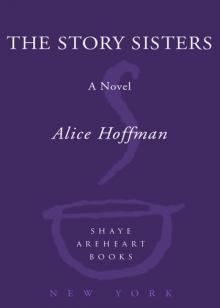 The Story Sisters
The Story Sisters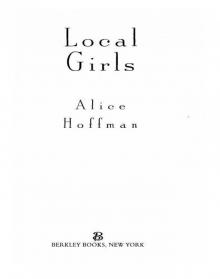 Local Girls
Local Girls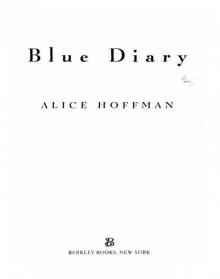 Blue Diary
Blue Diary The River King
The River King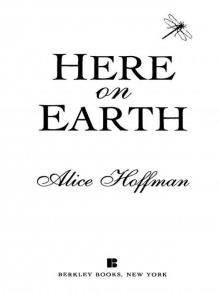 Here on Earth
Here on Earth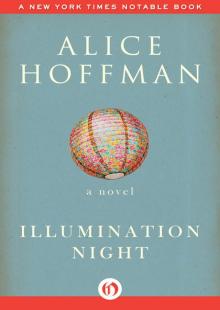 Illumination Night: A Novel
Illumination Night: A Novel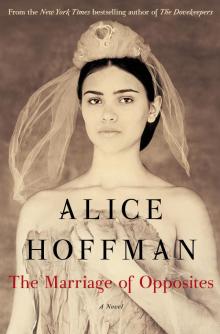 The Marriage of Opposites
The Marriage of Opposites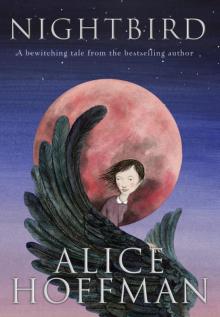 Nightbird
Nightbird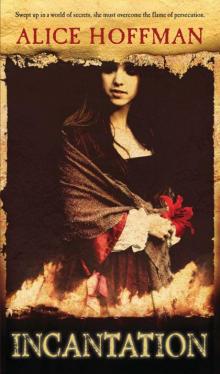 Incantation
Incantation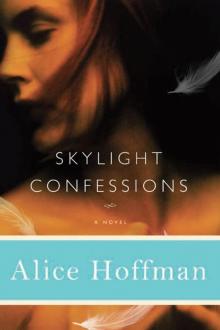 Skylight Confessions
Skylight Confessions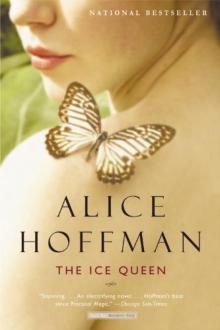 The Ice Queen
The Ice Queen Second Nature
Second Nature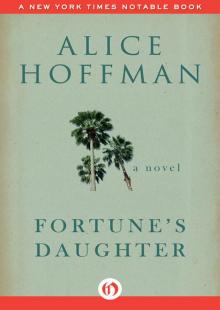 Fortune's Daughter: A Novel
Fortune's Daughter: A Novel Seventh Heaven
Seventh Heaven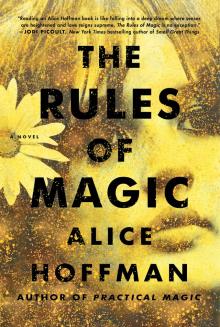 The Rules of Magic
The Rules of Magic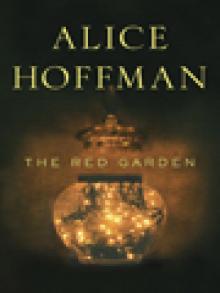 The Red Garden
The Red Garden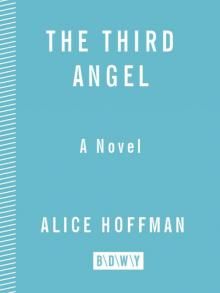 The Third Angel
The Third Angel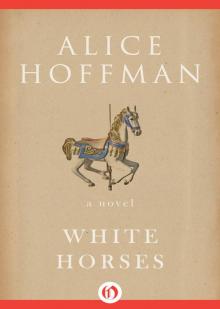 White Horses
White Horses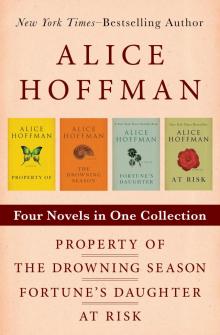 Property of / the Drowning Season / Fortune's Daughter / at Risk
Property of / the Drowning Season / Fortune's Daughter / at Risk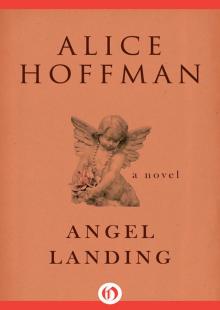 Angel Landing
Angel Landing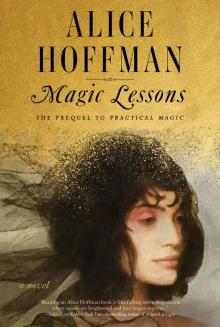 Magic Lessons
Magic Lessons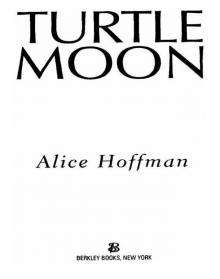 Turtle Moon
Turtle Moon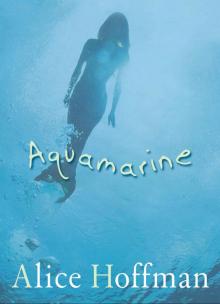 Aquamarine
Aquamarine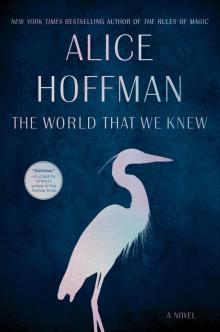 The World That We Knew
The World That We Knew Faithful
Faithful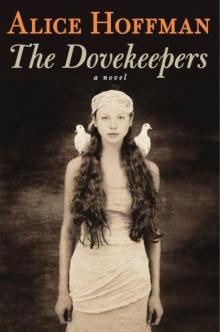 The Dovekeepers
The Dovekeepers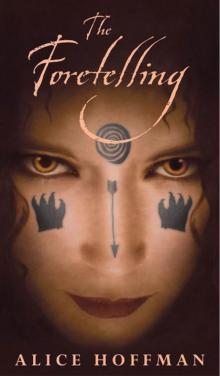 The Foretelling
The Foretelling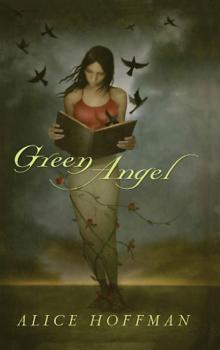 Green Angel
Green Angel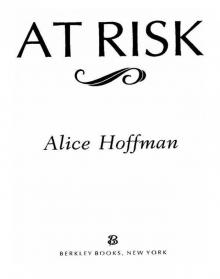 At Risk
At Risk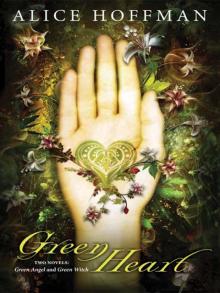 Green Heart
Green Heart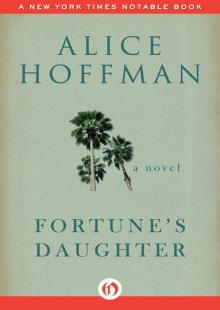 Fortune's Daughter
Fortune's Daughter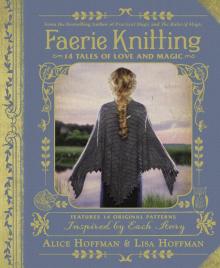 Faerie Knitting
Faerie Knitting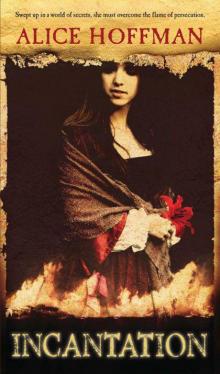 Incantation (v5)
Incantation (v5)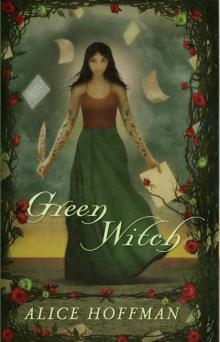 Green Witch
Green Witch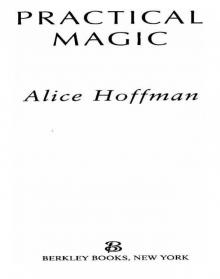 Practical Magic
Practical Magic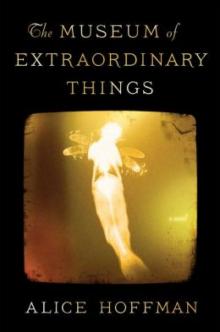 The Museum of Extraordinary Things
The Museum of Extraordinary Things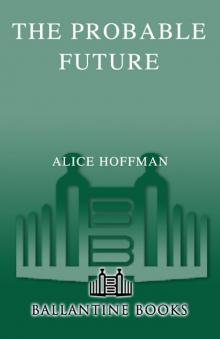 The Probable Future
The Probable Future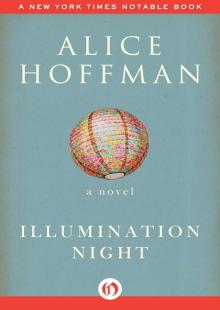 Illumination Night
Illumination Night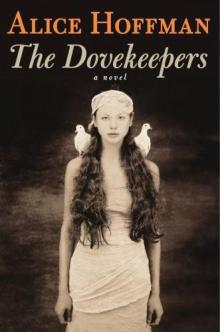 The Dovekeepers: A Novel
The Dovekeepers: A Novel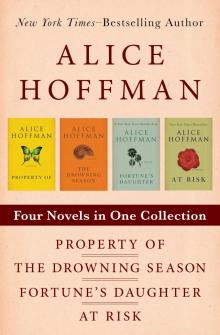 Property Of, the Drowning Season, Fortune's Daughter, and At Risk
Property Of, the Drowning Season, Fortune's Daughter, and At Risk